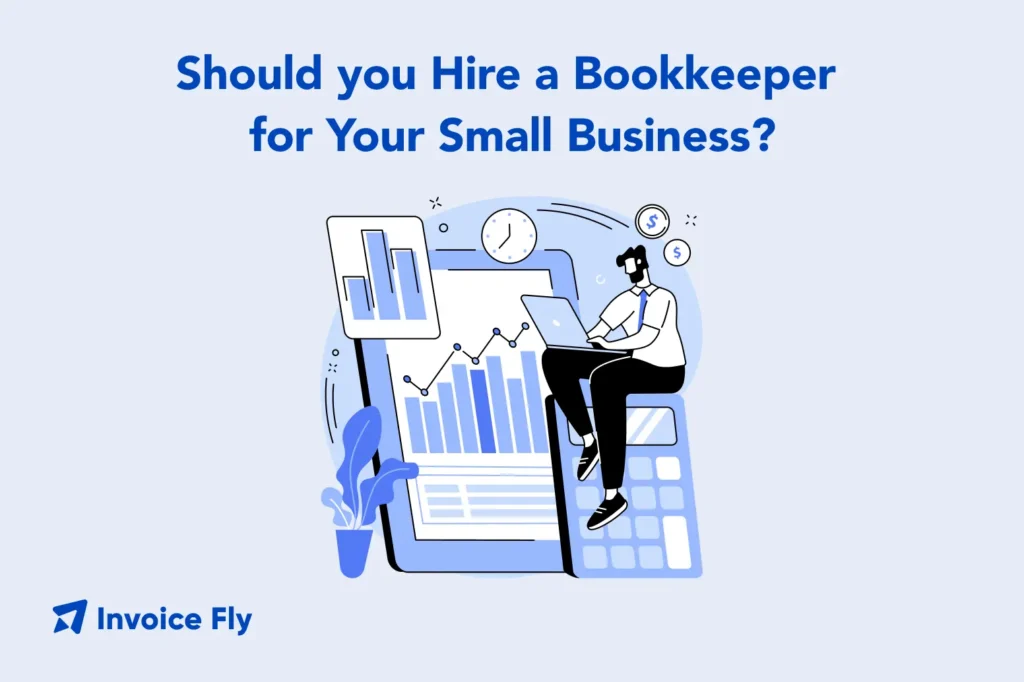Should You Hire a Bookkeeper for Your Small Business?

Table of Contents
- What is a bookkeeper?
- Why should I hire a bookkeeper?
- Benefits of hiring a qualified bookkeeper
- Benefits of doing it yourself
- What should you do?
- Steps to hire a good bookkeeper
- When should you hire a bookkeeper?
- Which type of bookkeeper should I hire?
- How much does it cost to hire a bookkeeper?
- What your bookkeeper can help you avoid
- Why hiring a bookkeeper could be your smartest business decision yet
- FAQs about Hiring A Bookkeeper
If you’re a small business owner juggling sales, operations, and taxes, you’ve probably hit that point where the numbers are beginning to pile up. Receipts go missing. Deadlines sneak up. And you’re stuck trying to make sense of a spreadsheet after hours.
So, do you keep doing it yourself, or is it time to hire a bookkeeper?
In this guide, we’ll break down:
- What they do
- Why small business owners hire one
- Pros and cons of hiring vs doing it yourself
- How to hire the right person
- When it makes the most sense to outsource
- What it costs and how to weigh the value
What is a bookkeeper?

According to Investopedia, while bookkeeping and accounting overlap, bookkeeping focuses on recording day-to-day transactions — a foundational role that supports more strategic accounting functions later on.
A bookkeeper keeps your day-to-day financial records organized and accurate. Think of them as the person who makes sure your cash flow, expenses, and transactions all end up in the right place. And more importantly, make sense when it’s time to hand everything off to your accountant.
Typical bookkeeping tasks include:
- Entering income and expenses
- Reconciling your bank account and credit card statements
- Tracking payroll and vendor payments
- Managing invoices and overdue payments
- Preparing monthly financial reports
In short: they spot issues before they snowball, help you stay tax-ready, and free up your time to run your business.
Many use trusted accounting software like QuickBooks Online to handle everything in the background, often working remotely through accounting firms or as freelance pros.

Why should I hire a bookkeeper?
Before diving in, it’s worth asking how clean books could support your broader financial goals — like budgeting, forecasting, or applying for funding. If you’re already working on your financial projections, having one can make the process faster and far more accurate.
You might need a one if:
- You’re spending hours on data entry instead of running your business
- You’re unsure which expense goes where (and it shows)
- You avoid tax prep until the last minute
- You want clean, accurate reports to help with decision-making
- You need someone detail oriented who won’t miss a thing
Even if your business is small, outsourcing your books can be a huge time-saver — and a stress reducer come tax season.
Benefits of hiring a qualified bookkeeper
QuickBooks explains that bookkeepers often handle the critical daily tasks that form the foundation of your financial health — and in many cases, they now work remotely through virtual services.
- Save time: No more late nights juggling spreadsheets.
- More accurate records: Fewer mistakes, less guesswork, better decisions.
- Smooth tax prep: Everything’s ready when your accountant needs it.
- Up-to-date financial info: Know where your cash stands in real time.
- Better software use: Let pros handle QuickBooks, payroll processing, and more.
- Peace of mind: You’re not alone in managing your finances.
Benefits of doing it yourself

Keeping things in-house is perfectly fine, especially if you’re just launching. You might prefer to DIY your books if:
- You want to stay close to every dollar
- You’re comfortable with bookkeeping software and basic reporting
- Your transactions are minimal and easy to track
- You’re watching every penny
Quick Glance: Pros & Cons of Hiring
| Hire | Do It Yourself | |
| Cost | Monthly service fee | Free, aside from your time |
| Time investment | Low: they handle day-to-day tracking | High: especially during busy seasons |
| Accuracy | Professional, less room for error | Risk of mistakes or missed deductions |
| Software expertise | Likely familiar with QuickBooks and integrations | Learning curve with new tools |
| Scalability | Can grow with your business | Becomes harder to manage as you grow |
What should you do?
In short; there’s no one-size-fits-all answer. However, if your books are not up to date, you worry about tax season, or you don’t trust your numbers, it’s most likely the time to hire someone.
You don’t have to jump straight into a full-time hire. Try part-time help, or start with free invoice templates to stay more organized while you figure things out.
Steps to hire a good bookkeeper
1. Look for professionals experienced with modern accounting software
A competent professional should be proficient in tools like QuickBooks Online, Xero, or similar cloud-based platforms. Ask which systems they’re familiar with, and how they integrate with your existing processes. Comfort with technology is non-negotiable for today’s remote workflows.
2. Verify qualifications and relevant credentials
Credentials like Certified Bookkeeper (CB) or Certified Public Bookkeeper (CPB) signal a commitment to professional standards. More importantly, ask about prior experience with businesses of your size or industry — it’s a better predictor of fit than titles alone.
3. Assess communication style and workflow compatibility
Set up a meeting to understand their work style. Ask questions regarding how they prefer to communicate, what reporting cadence they follow, and whether their work style aligns with how your team operates.
4. Clarify your business’s bookkeeping needs
Are you looking for weekly transaction categorization? Monthly reporting? Help with tax preparation or managing payroll processing? Be specific.
Defining the volume and complexity of your needs upfront helps avoid surprises and over- or under-hiring.
5. Finalize the agreement with a written contract
Before you start, agree on scope, billing terms (hourly, flat rate, or retainer), deliverables, and expected response times. A clear contract protects both sides and sets expectations from day one.
When should you hire a bookkeeper?
Still wondering when the tipping point is for hiring help? Bill.com lays out several signs that you’ve outgrown DIY bookkeeping — from missed deadlines to unclear reports.
We’ve noted the most important points below:
1. You are strapped for time
If you’re spending nights and weekends on your books, it’s time to get help.
2. You’re missing things
Late payments, skipped invoices, or uncategorized expenses are a sign it’s too much for one person to handle.
3. You’re behind
Falling behind on your books makes tax prep harder — and less accurate. A bookkeeper can help get you caught up and keep you there.
4. Taxes are torturous
If tax season is pure chaos, you need cleaner records and regular reports to avoid scrambling.
5. Profits aren’t increasing
If your revenue is growing but your profits aren’t, messy books could be part of the problem. See Gross Profit vs. Net Profit for what to look for.
Which type of bookkeeper should I hire?
You have options:
- A part-time or freelance (budget-friendly, flexible)
- A remote assistant (ideal for simple recurring tasks)
- A full-service bookkeeping firm (best for complex or growing businesses)
| Type | Best For | Pros | Considerations |
| Part-time | Small businesses with light transactions | Budget-friendly, flexible, hands-on support | May require more oversight |
| Assistant | Businesses needing help with daily tasks | Great for handling recurring tasks, remote ok | Typically entry-level or junior role |
| Bookkeeping firm | Growing or complex businesses | Full-service support, scalable, experienced | Higher cost, less personal contact |
How much does it cost to hire a bookkeeper?
Bookkeeping fees vary based on scope, complexity, and geography in the United States.
Freelance:
- generally charge $20–$60 per hour for routine tasks such as transaction entry, reconciliations, and payroll support.
- For professionals with advanced certifications or niche industry experience, rates often rise to $75–$150 per hour.
Bookkeeping firms or virtual bookkeeping services:
- Often charge flat monthly rates, typically ranging from $300 to $800+.
- These packages often meet regular needs. They include account reconciliations, sales tax tracking, tax preparation, and access to client portals or support tools.
Costs increase with:
- Certified professionals (e.g., CB or CPB)
- Deeper involvement in reporting and financial data analysis
- Year-round tax return preparation and audit readiness
- Bundled bookkeeping services including payroll and software integrations
Tip: If you’re on a tight budget, consider starting with a part-time or assistant and scaling up as your needs grow.
What your bookkeeper can help you avoid

A good bookkeeper helps to prevent the problems that quietly drain your time, money, and energy. From delayed payments to inaccurate reporting (or even the need for a bad debt calculation).
They’re often the first line of defense against financial blind spots that can snowball fast like:
- Overlooked deductions: Missed expenses can reduce your eligible write-offs and inflate your tax bill.
- Filing delays: Falling behind on tax deadlines — including quarterly filings and tax returns — can lead to penalties or interest.
- Incorrect sales tax reporting: Miscalculating sales tax or filing incorrectly increases audit risk.
- Payroll errors: Inaccurate payroll can trigger fines or damage employee trust.
- Poor recordkeeping: Disorganized or outdated financial data makes it harder to assess performance or qualify for funding.
If you’re not sure how much cash you actually have available, read: What is a Ledger Balance?
Bottom line: they help you avoid the kind of mistakes that cost real money… and sleep.
Need a hand with the basics? Invoice Fly’s Invoice Maker makes it easy to create, send, and organize your invoices — for free.

Why hiring a bookkeeper could be your smartest business decision yet
Bookkeepers keep your financial records accurate and up to date — so you’re not guessing when cash flow, expenses, or tax season comes into question. With better reporting, you can make decisions based on actual numbers, not estimates.
They’ll also help you stay ahead of tax preparation, avoid common mistakes with sales tax, and keep your financial data organized. That kind of attention to detail can make a significant difference. Especially when your financial information needs to be audit-ready or shared with your accountant.
For many small business owners in the United States, even a few hours of help a week can reduce stress and make tax time easier. Your tax returns, reports, and decisions are stronger when they’re built on clean books
Need simpler finances? Try Invoice Fly’s Invoice Maker — It’s free!
FAQs about Hiring A Bookkeeper
When bookkeeping eats into your actual business hours, it’s time to bring in help.
If they save you time, reduce your stress, and help you stay tax-ready — yes, they’re worth it.
The biggest downside is cost — and the risk of hiring someone who’s not a good fit. Vet thoroughly.
Anywhere from $20/hour for a freelancer to $1,000/month for a full-service firm.
Absolutely. Many small business owners rely on them to stay organized and avoid financial mistakes.
It varies. For a small business, it might be 2–4 hours/week. For busier shops, 10+ hours isn’t unusual.
